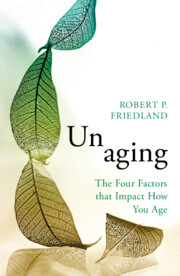Book contents
- Unaging
- Reviews
- Unaging
- Copyright page
- Dedication
- Contents
- List of Figures and Tables
- Preface
- Part I Foundations: What Do We Need to Know about Optimal Aging?
- Part II Applications: What Can We Do about the Opportunity of Aging?
- 12 Overview
- 13 Physical Activity
- 14 Whole Body Health
- 15 Mental Activity
- 16 Psychological Measures
- 17 Social Factors
- 18 Dealing with Stress
- 19 Sleep
- 20 Diet
- 21 Microbial Considerations
- 22 Dental Care
- 23 Dealing with Doctors and Drugs
- 24 Hazardous Behaviors
- 25 Toxic Exposures
- Part III Conclusions
- Acknowledgments
- Glossary
- References
- Index
12 - Overview
from Part II - Applications: What Can We Do about the Opportunity of Aging?
Published online by Cambridge University Press: 15 September 2022
- Unaging
- Reviews
- Unaging
- Copyright page
- Dedication
- Contents
- List of Figures and Tables
- Preface
- Part I Foundations: What Do We Need to Know about Optimal Aging?
- Part II Applications: What Can We Do about the Opportunity of Aging?
- 12 Overview
- 13 Physical Activity
- 14 Whole Body Health
- 15 Mental Activity
- 16 Psychological Measures
- 17 Social Factors
- 18 Dealing with Stress
- 19 Sleep
- 20 Diet
- 21 Microbial Considerations
- 22 Dental Care
- 23 Dealing with Doctors and Drugs
- 24 Hazardous Behaviors
- 25 Toxic Exposures
- Part III Conclusions
- Acknowledgments
- Glossary
- References
- Index
Summary
There are many things we can do to reduce the risk of Alzheimer’s, including high levels of physical and mental activity, avoidance of hypertension, head injury, high-fat, low-fiber diet, smoking, etc. These risk factors have been documented by decades of human and animal research and have allowed for the development of protective lifestyle measures that lead to a lowered risk of disease. These lifestyle factors apply to all phases of the life cycle, including childhood, as well as late life, and contribute to diminishing the risk of getting dementia, as well as delaying its onset and speed of progression. In the applications section there is a comprehensive discussion of these factors that will lower the risk of neurodegenerative diseases, improve our resilience so that function can be maintained despite development of disease, and enhance the capacity of all of the four reserve factors: cognitive, physical, psychological, and social. The actions recommended are all also valuable for lowering the risk of heart disease and stroke as well as some forms of cancer. Enhancing these reserve factors will enable you to augment your enjoyment of the opportunity aging presents.
- Type
- Chapter
- Information
- UnagingThe Four Factors that Impact How You Age, pp. 185 - 191Publisher: Cambridge University PressPrint publication year: 2022

